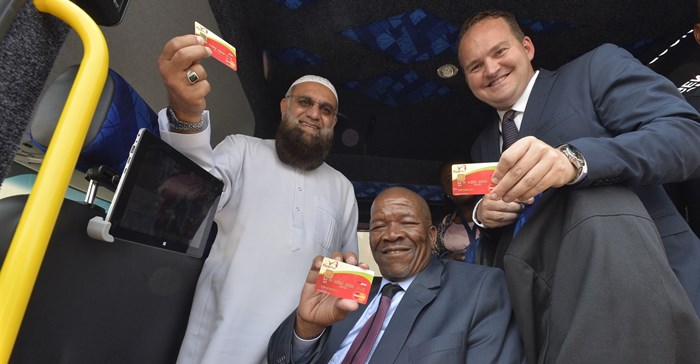
Top stories






AutomotiveHilux Custom Builds offers purpose-built solutions for your business
Toyota South Africa Motors 16 Feb 2026
More news


Marketing & Media
Ads are coming to AI. Does that really have to be such a bad thing?














The card-based project will be introduced on the Johannesburg, Pretoria and Mabopane (JPM) route. It was selected as the JPM Taxi Association has been involved in previous pilot projects and has experience in dealing with the cashless system. It will then be expanded to other taxi routes, with the aim of completing a national rollout within five years.
The taxi e-ticketing system is owned and being implemented by FairPay, of which TaxiChoice - the commercial arm of the South African National Taxi Council (Santaco) - is currently the sole shareholder, with Curve Group Holdings as the primary technology partner.
The introduction of the FairPay card coincides with the October Transport Month campaign by the provincial government under the theme “Modernisation of Public Transport in Gauteng”. Vadi welcomed the idea of an e-ticket for the taxi industry saying that it is “a step in the right direction that will result in a single electronic for public transport in Gauteng”.
“The standard that must be strived for is ‘One Province–One Ticket’ in line with the national electronic fare collection regulations,” he added.
The project has been under development over the last five years and has been through various phases of testing to ensure that all the components are working as required. “The system has now been tested thoroughly and is fully compliant with all laws and regulations, as well as requirements of all the parties involved. We are ready for the roll out,” says Jothan Msibi, Chairman of TaxiChoice.
“We believe in connecting people to opportunity and this project represents a leap ahead for the South African taxi industry. Through the use of digital technology we can assist millions of hard-working people to be more connected, more informed and lead better lives,” adds Fred Baumhardt, CEO of Curve Group.
According to Msibi, the switch to the card-based system offers benefits for everyone involved, starting off with the commuter: “It’s safer and more secure because commuters will no longer have to carry cash, or worry about whether the taxi driver will have enough change for them.”
The first phase which is the JPM route is set to be rolled out in February 2017, whereby commuters will be able to load their FairPay cards via point of sale (POS) devices and via kiosks at taxi ranks, though eventually these services will also be available in selected retail stores.
“In terms of South African regulations, you have to use a fully-compliant EMV bank card. So even though it’s starting off as a taxi fare collection card, it can evolve so that commuters can use it for transactions just like a debit card,” says Msibi. The technology also enables the easy provisioning of new services, such as incentivising the adoption of the card through reduced fares for pensioners and persons with disabilities in the future.
Apart from being able to process card payments, the equipment installed in taxis also contains a GPS device and can act as a Wi-Fi hotspot, providing commuters with internet connectivity while they travel. The information gathered through the GPS device will go a long way toward improving driver behaviour and safety in the South African taxi industry, with a record being kept of incidents such as speeding, harsh acceleration and braking, while UIF and Skills Levies contributions will further unlock millions in SETA and other funding for industry training.
Taxi operators stand to benefit from automated bookkeeping and improved business compliance while moving toward formal banking for transactions also helps improve their creditworthiness.
The data will provide a more accurate understanding of the volumes of people making use of specific routes, allowing for better fleet management and route planning. This information can also be shared with government, enabling it to make data-driven decisions when it comes to ensuring that under-serviced areas get the required level of transportation services that they require.